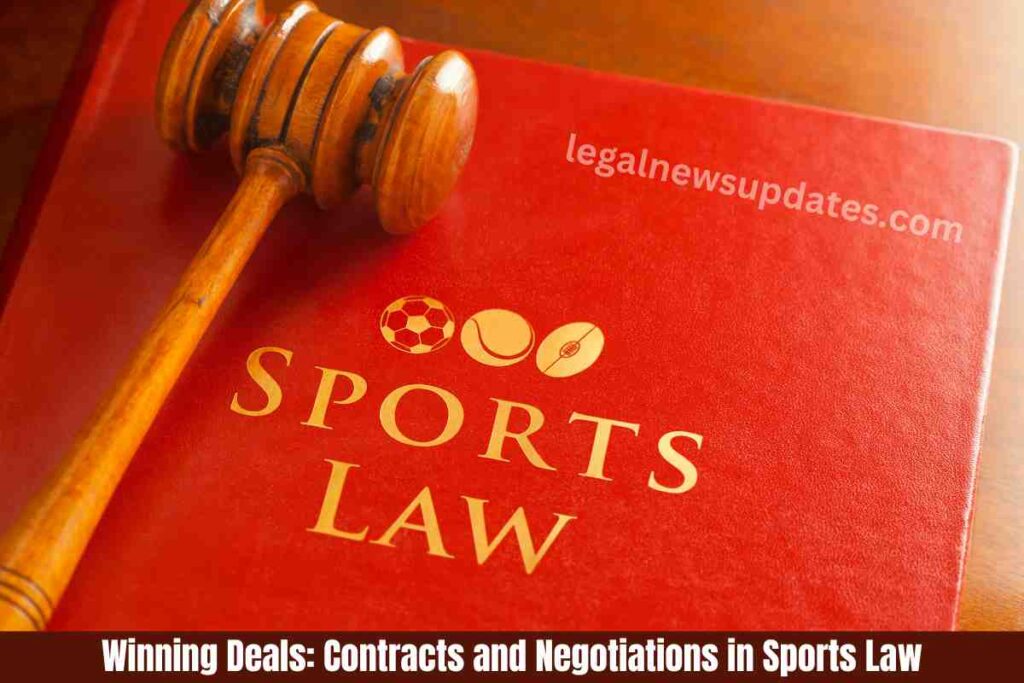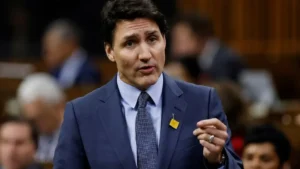Winning Deals: Contracts and Negotiations in Sports Law

Sports Law: Contracts and Negotiations
Winning Deals: Contracts and Negotiations in Sports Law: Sports law is a specialized field that combines elements of contract law, labour law, antitrust law, and tort law to address the unique legal issues faced by athletes, teams, and leagues. Central to sports law is contracts and negotiations, which govern the relationships between these parties. In this extensive blog, we will explore the intricate world of sports contracts, the negotiation process, and the various legal and practical considerations that come into play.
The Foundation of Sports Contracts
What is a Sports Contract?
A sports contract is a legally binding agreement between an athlete and a sports team or organization. It outlines the terms and conditions of the athlete’s employment, including salary, bonuses, duration of the contract, performance incentives, and other benefits. The contract also includes clauses related to conduct, injuries, and the responsibilities of both parties.
Critical Components of a Sports Contract
Sports contracts typically include several key components:
- Term and Duration: Specifies the length of the contract, including start and end dates.
- Compensation: Details the athlete’s salary, signing bonuses, performance bonuses, and any other financial incentives.
- Duties and Obligations: This section outlines the athlete’s responsibilities, including training, participation in games, and adherence to team rules.
- Termination Clauses: Conditions under which either party can terminate the contract, such as breaches of contract or moral turpitude.
- Injury Clauses: Provisions for what happens if the athlete is injured, including medical care and compensation during recovery.
- Image Rights: Terms related to using the athlete’s image and likeness for promotional purposes.
Types of Sports Contracts
There are several types of sports contracts, each catering to different needs and circumstances:
- Standard Player Contracts: These contracts cover basic employment terms and conditions, and they are common in team sports like football, basketball, and baseball.
- Endorsement Contracts: Agreements between athletes and companies to promote products or services.
- Transfer Agreements: In sports like soccer, where players are transferred between clubs, these contracts govern the terms of the transfer.
- Collective Bargaining Agreements (CBAs): Negotiated between leagues and players’ unions, these agreements set the framework for player contracts and working conditions.
The Negotiation Process: Winning Deals: Contracts and Negotiations in Sports Law
Pre-Negotiation Preparation
Effective contract negotiations require thorough preparation. This includes understanding the market value of the athlete, the team’s salary cap situation, and the needs and goals of both parties. Agents play a crucial role in this phase, providing expertise and leveraging their knowledge and relationships within the industry.
Initial Discussions
The negotiation process often begins with informal discussions between the athlete’s agent and team representatives. These discussions help gauge mutual interest and set the stage for more formal negotiations.
Formal Negotiations
During formal negotiations, both parties present their demands and concessions. This phase can be lengthy and complex, involving multiple rounds of offers and counteroffers. Key negotiation points typically include salary, contract length, bonuses, and clauses related to performance and conduct.
Mediation and Arbitration
Mediation or arbitration may be employed to resolve disputes when negotiations reach an impasse. Mediation involves a neutral third party who facilitates discussions and helps both sides reach a compromise. Arbitration, on the other hand, involves a third party who listens to both sides and makes a binding decision.
Legal and Ethical Considerations: Winning Deals: Contracts and Negotiations in Sports Law
Contract Law Principles
Sports contracts are governed by the same principles as other types of contracts. These principles include offer and acceptance, consideration, and mutual consent. Both parties must agree to the terms, and the contract must be supported by something of value (consideration).
Labor Law and Collective Bargaining
In many sports, athletes are represented by unions that negotiate collective bargaining agreements (CBAs) with leagues. These CBAs cover various issues, including salaries, working conditions, and dispute resolution mechanisms. Labour law plays a significant role in these negotiations, protecting athletes’ rights.
Antitrust Law
Antitrust law also impacts sports contracts and negotiations, particularly regarding league rules and restrictions. For example, salary caps and free agency rules can raise antitrust issues if they are seen as restraining trade or limiting competition.
Ethical Considerations
Ethical considerations are paramount in sports contract negotiations. Agents and representatives must act in the best interests of their clients, avoiding conflicts of interest and ensuring transparency. Additionally, both parties must adhere to the terms of the contract in good faith, respecting the spirit as well as the letter of the agreement.
High-Profile Contract Negotiations: Winning Deals: Contracts and Negotiations in Sports Law
Notable Examples
Several high-profile contract negotiations have captured public attention, highlighting the complexities and stakes involved. For instance, the talks between NBA superstar LeBron James and various teams over his career have showcased the influence of an athlete’s marketability and the strategic considerations of both player and team.
Lessons Learned
These high-profile cases offer valuable lessons for both athletes and teams. Key takeaways include:
- The importance of preparation.
- The value of solid representation.
- There is a need for flexibility and creativity in finding mutually beneficial solutions.
The Role of Agents and Attorneys: Winning Deals: Contracts and Negotiations in Sports Law
Agents: Advocates and Negotiators
Sports agents play a critical role in contract negotiations, serving as advocates and negotiators for their clients. They leverage their expertise and industry connections to secure the best possible terms and provide valuable guidance on market trends and career planning.
Attorneys: Legal Advisors
Attorneys provide essential legal advice throughout the negotiation process. They ensure that contracts comply with relevant laws and regulations and help resolve any legal disputes. Attorneys also play a crucial role in drafting and reviewing contract language to protect their client’s interests.
Emerging Trends and Future Directions: Winning Deals: Contracts and Negotiations in Sports Law
The Impact of Technology
Technology is increasingly influencing sports contract negotiations. Data analytics, for instance, provides valuable insights into player performance and market value, helping both sides make informed decisions. Additionally, digital platforms facilitate communication and streamline the negotiation process.
Changing Market Dynamics
The sports industry constantly evolves, with changing market dynamics impacting contract negotiations. The rise of new leagues, shifts in fan preferences, and economic factors all shape the landscape. Understanding these trends is crucial for successful negotiations.
The Role of Social Media
Social media has transformed how athletes interact with fans and brands, impacting their marketability and endorsement opportunities. Contract negotiations now often consider an athlete’s social media presence and influence, adding a new dimension to the process.
Conclusion: Winning Deals: Contracts and Negotiations in Sports Law
Sports law and contract negotiations are complex, multifaceted areas that require a deep understanding of legal principles, industry dynamics, and negotiation strategies. Successful negotiations result in mutually beneficial agreements that support athletes’ careers and teams’ goals. As the sports industry evolves, staying informed about emerging trends and best practices will be essential for all stakeholders involved in sports contracts and negotiations.







